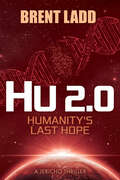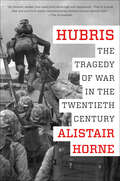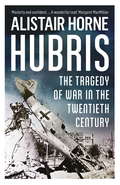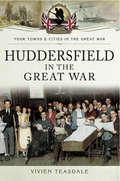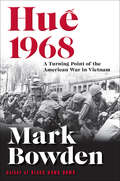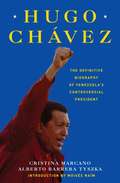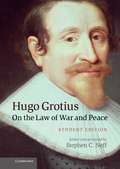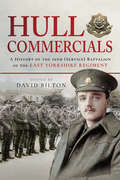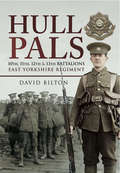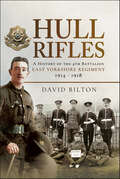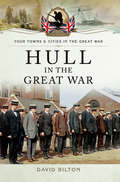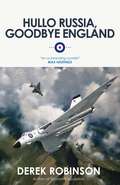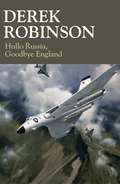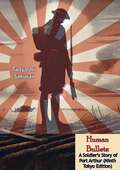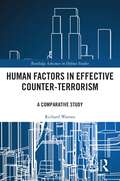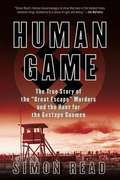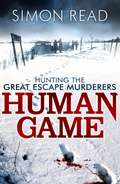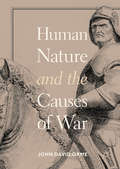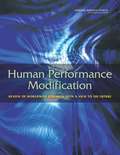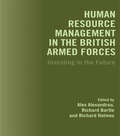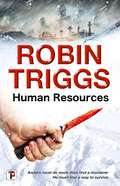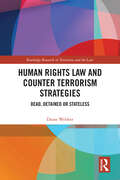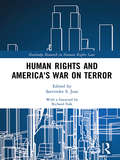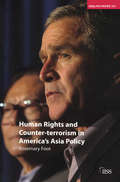- Table View
- List View
Hu 2.0: Humanity's Last Hope (A Jericho Thriller)
by Brent LaddThe future is not all automation and robots. As mankind advances, he also falters: Can a man born of science find his humanity in a polarized dystopian society bent on destruction and greed? In Brent Ladd's newest release, Hu 2.0 tells a story of mankind's possible future—one that is ripped apart when the evolution of the species divides into two categories: Human 1.0 (original) and 2.0 (new). The rift sparks a war that leaves the planet decimated, with original humans on the brink of extinction. A man made from science and raised by AI, Jericho must find and fight for his place in this new world if he hopes to save it.
Hubris: The Tragedy of War in the Twentieth Century
by Alistair HorneAn “eminently provocative and readable” history examining six critical battles of the early twentieth century (The Wall Street Journal).Sir Alistair Horne has been a close observer of war and history for more than fifty years and in this wise and masterly work, he revisits six battles of the past century and examines the strategies, leadership, preparation, and geopolitical goals of aggressors and defenders to reveal the one trait that links them all: hubris.In Greek tragedy, hubris is excessive human pride that challenges the gods and ultimately leads to total destruction of the offender. From the 1905 Battle of Tsushima in the Russo-Japanese War, to Hitler's 1941 bid to capture Moscow, to MacArthur's disastrous advance in Korea, to the French downfall at Dien Bien Phu, Horne shows how each of these battles was won or lost due to excessive hubris on one side or the other. In a sweeping narrative written with his trademark erudition and wit, Horne provides a meticulously detailed analysis of the ground maneuvers employed by the opposing armies in each battle. He also explores the strategic and psychological mindset of the military leaders involved to demonstrate how devastating combinations of human ambition and arrogance led to overreach. Making clear the danger of hubris in warfare, his insights hold resonant lessons for civilian and military leaders navigating today’s complex global landscape.A dramatic, colorful, stylishly-written history, Hubris is a much-needed reflection on war from a master of his field.
Hubris: The Tragedy of War in the Twentieth Century
by Sir Alistair Horne CBEAlistair Horne has been a close observer of war and history for more than fifty years. In this wise and masterly work, he revisits six battles that changed the course of the twentieth century and reveals the one trait that links them all: hubris. From the Battle of Tsushima in the Russo-Japanese War of 1905 to Hitler's 1941 bid to capture Moscow, and from the disastrous American advance in Korea to the French surrender at Dien Bien Phu, Horne shows how each of these battles was won or lost due to excessive hubris on one side or the other.A dramatic, colourful and stylishly written history, HUBRIS is an essential reflection on war from a master of his field.
Huddersfield in the Great War (Your Towns & Cities in the Great War)
by Vivien TeasdaleWhen war was declared in August 1914, it not only changed the lives of the soldiers who fought, but also the lives of their families, their neighbourhood and, ultimately, the whole of society. Women came out of their homes to take up work in industry, to drive the trams, to police the streets as well as nurse the wounded. Government, local and national, imposed extensive controls on all aspects of social life - who could remain in work, who had to fight, what could be grown as crops, what clothes were appropriate and how to feed a family. This study looks at how these changes affected Huddersfield and its inhabitants, showing how employment changed, how the town contributed to financing the war and how the local tribunals dealt with those who did not want to fight. Local families, from the highest to the lowest walks of life, find their stories illustrated here.
Hue 1968: A Turning Point of the American War in Vietnam
by Mark BowdenThe author of Black Hawk Down vividly recounts a pivotal Vietnam War battle in this New York Times bestseller: “An extraordinary feat of journalism”. —Karl Marlantes, Wall Street JournalIn Hue 1968, Mark Bowden presents a detailed, day-by-day reconstruction of the most critical battle of the Tet Offensive. In the early hours of January 31, 1968, the North Vietnamese launched attacks across South Vietnam. The lynchpin of this campaign was the capture of Hue, Vietnam’s intellectual and cultural capital. 10,000 troops descended from hidden camps and surged across the city, taking everything but two small military outposts.American commanders refused to believe the size and scope of the siege, ordering small companies of marines against thousands of entrenched enemy troops. After several futile and deadly days, Lieutenant Colonel Ernie Cheatham would finally come up with a strategy to retake the city block by block, in some of the most intense urban combat since World War II.With unprecedented access to war archives in the United States and Vietnam and interviews with participants from both sides, Bowden narrates each stage of this crucial battle through multiple viewpoints. Played out over 24 days and ultimately costing 10,000 lives, the Battle of Hue was by far the bloodiest of the entire war. When it ended, the American debate was never again about winning, only about how to leave.A Los Angeles Times Book Prize Finalist in HistoryWinner of the 2018 Marine Corps Heritage Foundation Greene Award for a distinguished work of nonfiction
Hugo Chávez
by Cristina Marcano Alberto Barrera TyszkaHe is one of the most controversial and important world leaders currently in power. In this international bestseller, at last available in English, Hugo Chávez is captured in a critically acclaimed biography, a riveting account of the Venezuelan president who continues to influence, fascinate, and antagonize America. Born in a small town on the Venezuelan plains, Chávez found his interests radically altered when he entered the military academy in Caracas...
Hugo Grotius on the Law of War and Peace
by Stephen C. NeffDespite its significant influence on international law, international relations, natural law and political thought in general, Grotius's Law of War and Peace has been virtually unavailable for many decades. Stephen Neff's edited and annotated version of the text rectifies this situation. Containing the substantive portion of the classic text, but shorn of extraneous material, this edited and annotated edition of one of the classic works of Western legal and political thought is intended for students and teachers in four primary areas: history of international law, history of political thought, history of international relations and history of philosophy.
Hull Commercials: A History of the 10th (Service) Battalion of the East Yorkshire Regiment
by David BiltonIn the 1930s five men wrote a history of the battalion they had proudly served with: the 1st Hull Battalion, known today as the 10th East Yorkshire Regiment or The Commercials. The book is the story of a happy family, men drawn together to fight for justice. There is no attempt to look at the bigger picture, and no attempt is made to comment on tactics or strategy; it is simply the story of a group of men and their travels across England, Egypt and the Western Front and what they achieved. Their love for their fellow soldiers and the battalion being clearly shown in early 1918 when the original members were all asked if they would like to train to become officers: the vast majority refused, preferring to stay in the ranks with their friends.The story is carefully crafted and based upon personal diaries, now long gone, and conversations between the participants. As well as the story of the battalions travels the appendices list awards, a diary of movement and a roll of honor. The editor, known for his work on the Hull Pals has added a complete listing of the original battalion, extra photographs, previously unpublished, and relevant footnotes.This book is the third book in the 1st Hull Pals trilogy and is essential reading for all interested in the Pals Battalions, providing a clear and concise record of a typical battalion at war.
Hull Pals: 10th, 11th, 12th and 13th Battalions East Yorkshire Regiment (Pals Ser.)
by David BiltonIn response to Kitchener's famous call for a million volunteers, local communities raised entire battalions for the service on the Western Front. Hull folk are reticent people and the Hull Pals were no exception. This book tells their inspiring story of sacrifice and gallantry under appaling conditions. Hull Pals contains a great number of hitherto unpublished eye-witnessed accounts and photographs.As featured on BBC Radio Humberside and in The Yorkshire Post.
Hull Rifles: A History of the 4th Battalion East Yorkshire Regiment, 1914–1918
by David BiltonHull Rifles looks at the 4th East Yorkshire Regiment during the Great War and examines the origins of the battalion and its history over the three years it fought in France and Belgium. The battalion was involved in some of the bloodiest battles of the war and suffered such high casualty rates in early 1918 that the unit ceased to exist, except in name. The men of the original battalion were Territorials, part-time soldiers who gave their free time to provide home defense during a war. Officially formed on 1 April 1908 as a result of the Haldane changes, the unit could trace its history back hundreds of years and was one of the oldest in the country. All the men were volunteers and held a full-time job. They had committed themselves to regular weekly training and a camp in the summer where they practised large-scale manoeuvres with other units. When the call came to volunteer for overseas service, 80 per cent came forward. Their ranks were quickly filled with new volunteers who were prepared to fight abroad. Volunteer numbers were high and quickly the overseas battalion was at full strength, as was a second for home service. A third battalion was also formed to provide replacements for the men at the Front. As well as fighting on the Western Front, a battalion was sent to guard Bermuda for the duration. The text uses letters, newspaper cuttings and the war diary to provide a detailed picture of a typical Territorial battalion at war. Also included are many previously unseen photographs, a nominal list of the men who volunteered before Christmas 1915, including a convicted murderer, awards, casualty details and lists of officers.
Hull in the Great War (Your Towns & Cities in the Great War)
by David BiltonThe outbreak of war in 1914 aroused an enthusiasm in Hull and within the first six months 20,000 local men had enrolled. Hull was also attacked by Zeppelins and it raised its own Pals Battalions. This book looks at how the experience of war impacted on the City, from the initial enthusiasm for sorting out the German Kaiser in time for Christmas 1914, to the gradual realization of the enormity of human sacrifice the families of Hull were committed to as the war stretched out over the next four years. The Great War affected everyone. At home there were wounded soldiers in military hospitals, refugees from Belgium and later on German prisoners of war. There were food and fuel shortages and disruption to schooling. The role of women changed dramatically and they undertook a variety of work undreamed of in peacetime. Meanwhile, men serving in the armed forces were scattered far and wide. Extracts from contemporary letters reveal their heroism and give insights into what it was like under battle conditions.As featured in the Hull Daily Mail.
Hullo Russia, Goodbye England
by Derek RobinsonFlight Lieutenant Silk, a twice-decorated Lancaster pilot in WW II, rejoins the R. A. F. and qualifies to fly the Vulcan bomber. Piloting a Vulcan is an unforgettable experience: no other aircraft comes close to matching its all-round performance. And as bombers go, it's drop-dead gorgeous. But there's a catch. The Vulcan has only one role: to make a second strike. To act in retaliation for a Russian nuclear attack. Silk knows that knows that if he ever flies his Vulcan in anger, he'll be flying from a smoking wasteland, a Britain obliterated. But in the mad world of Mutually Assured Destruction, the Vulcan is the last - the only - deterrent. Derek Robinson returns with another rip-roaring, gung-ho R. A. F. adventure, one that exposes and confronts the brinkmanship and sabre-rattling of the Cold War Era.
Hullo Russia, Goodbye England
by Derek RobinsonFlight Lieutenant Silk, a twice-decorated Lancaster pilot in WW II, rejoins the R.A.F. and qualifies to fly the Vulcan bomber. Piloting a Vulcan is an unforgettable experience: no other aircraft comes close to matching its all-round performance. And as bombers go, it's drop-dead gorgeous. But there's a catch. The Vulcan has only one role: to make a second strike. To act in retaliation for a Russian nuclear attack. Silk knows that knows that if he ever flies his Vulcan in anger, he'll be flying from a smoking wasteland, a Britain obliterated. But in the mad world of Mutually Assured Destruction, the Vulcan is the last - the only - deterrent. Derek Robinson returns with another rip-roaring, gung-ho R.A.F. adventure, one that exposes and confronts the brinkmanship and sabre-rattling of the Cold War Era.
Hullo Russia, Goodbye England
by Derek RobinsonFlight Lieutenant Silk, a twice-decorated Lancaster pilot in WW II, rejoins the R.A.F. and qualifies to fly the Vulcan bomber. Piloting a Vulcan is an unforgettable experience: no other aircraft comes close to matching its all-round performance. And as bombers go, it's drop-dead gorgeous. But there's a catch. The Vulcan has only one role: to make a second strike. To act in retaliation for a Russian nuclear attack. Silk knows that knows that if he ever flies his Vulcan in anger, he'll be flying from a smoking wasteland, a Britain obliterated. But in the mad world of Mutually Assured Destruction, the Vulcan is the last - the only - deterrent. Derek Robinson returns with another rip-roaring, gung-ho R.A.F. adventure, one that exposes and confronts the brinkmanship and sabre-rattling of the Cold War Era.
Human Bullets: A Soldier's Story of Port Arthur (Ninth Tokyo Edition)
by Tadyoshi SakuraiTadyoshi Sakurai’s Human Bullets: A Soldier's Story of Port Arthur is a gripping firsthand account of the Russo-Japanese War (1904–1905), offering an unflinching look at the brutal realities of warfare. Written by a Japanese officer who fought in the Siege of Port Arthur, this memoir provides a rare and vivid perspective on one of the most significant military campaigns of the early 20th century.Sakurai’s narrative captures the courage, sacrifice, and unyielding spirit of the Japanese soldiers as they faced overwhelming odds in their quest to seize the heavily fortified Russian stronghold of Port Arthur. Through his candid descriptions, he conveys the physical and emotional toll of the battlefield, detailing the grueling assaults, the devastating losses, and the camaraderie among his comrades. The title, Human Bullets, reflects the soldiers’ unwavering dedication and willingness to serve as the very instruments of their nation’s military strategy.Beyond the harrowing combat scenes, Sakurai reflects on the larger themes of loyalty, patriotism, and the human cost of war. His writing is both raw and poignant, offering insights into the mindset of a soldier shaped by duty and honor.Human Bullets is not only a historical document but also a powerful anti-war statement that underscores the futility and tragedy of conflict. It remains a valuable resource for historians, military enthusiasts, and anyone seeking to understand the complexities of war from a deeply personal perspective.
Human Factors in Effective Counter-Terrorism: A Comparative Study (Routledge Advances in Defence Studies)
by Richard WarnesThis book seeks to provide a comparative assessment of the significance of ‘human factors’ in effective counter-terrorism. The phrase ‘human factors’ is used to describe personal relationships, individual capabilities, effective leadership, technical interface, organisational culture and the community engagement necessary to effectively minimise, counter and control the threat of terrorism. Unlike many works in the field, this book is constructed around the input of ‘experienced knowledge’ from over 170 semi-structured interviews of specialist military, policing, intelligence and security practitioners - those actors actually involved in countering terrorism. These practitioners come from seven countries – the United Kingdom, Ireland, France, Spain, Israel, Turkey and the United States – all of which have suffered over the years from different types of terrorist threat and responded with a mixture of counter-terrorist measures. Where military practitioners also discussed overseas counter-insurgency measures, that material has been included, since terrorism forms a key aspect of such wider insurgencies. The resulting interview data was analysed through a variant of ‘Grounded Theory’ to identify key emerging themes and issues, both positive and negative, relevant to ‘human factors’ in the individual countries and more generically. This book incorporates the informed operational experiences and insights of the interviewees while seeking to provide examples of successful counter-terrorist measures at the strategic, operational and tactical levels. This book will be of much interest to students of counter-terrorism, defence studies and security studies in general.
Human Game
by Simon ReadIn March and April of 1944, Gestapo gunmen killed fifty POWs--a brutal act in defiance of international law and the Geneva Conventions. This is the true story of the men who hunted them down. The mass breakout of seventy-six Allied airmen from the infamous Stalag Luft III became one of the greatest tales of World War II, immortalized in the film The Great Escape. But where Hollywood's depiction fades to black, another incredible story begins . . . Not long after the escape, fifty of the recaptured airmen were taken to killing fields throughout Germany and shot on the direct orders of Hitler. When the nature of these killings came to light, Churchill's government swore to pursue justice at any cost. A revolving team of military police, led by squadron leader Francis P. McKenna, was dispatched to pick up a trail long gone cold. Amid the chaos of postwar Germany, divided between American, British, French, and Russian occupiers, McKenna led a three-year manhunt that brought twenty-one Gestapo killers to justice. In Human Game, Simon Read delivers a clear-eyed and meticulously researched account of this often overlooked saga of hard-won justice. INCLUDES PHOTOS
Human Game: The True Story Of The 'great Escape' Murders And The Hunt For The Gestapo Gunmen
by Simon ReadIn March 1944, 76 Allied officers tunnelled out of Stalag Luft III. Of the 73 captured, 50 were shot by direct order of Hitler. This is the story of how a British Bobby from Blackpool, Frank McKenna, was sent to post-war Germany on the express orders from Churchill to bring the Gestapo murderers to justice. In a quest that ranges from the devastated, bombed out cities of Europe to the horrors of the concentrations camps, McKenna is relentless in his pursuit. A gripping read set in the aftermath of World War II.
Human Nature and the Causes of War
by John David OrmeWhat are the causes of war? Wars are generally begun by a revisionist state seeking to take territory. The psychological root of revisionism is the yearning for glory, honor and power. Human nature is the primary cause of war, but political regimes can temper or intensify these passions. This book examines the effects of six types of regime on foreign policy: monarchy, republic and sultanistic, charismatic, and military and totalitarian dictatorship. Dictatorships encourage and unleash human ambition, and are thus the governments most likely to begin ill-considered wars. Classical realism, modified to incorporate the impact of regimes and beliefs, provides a more convincing explanation of war than neo-realism.
Human Performance Modification
by National Research Council Division on Engineering and Physical Sciences Division of Behavioral and Social Sciences and Education Board on Behavioral, Cognitive, and Sensory Sciences Committee on Assessing Foreign Technology Development in Human Performance ModificationThe development of technologies to modify natural human physical and cognitive performance is one of increasing interest and concern, especially among military services that may be called on to defeat foreign powers with enhanced warfighter capabilities. Human performance modification (HPM) is a general term that can encompass actions ranging from the use of "natural" materials, such as caffeine or khat as a stimulant, to the application of nanotechnology as a drug delivery mechanism or in an invasive brain implant. Although the literature on HPM typically addresses methods that enhance performance, another possible focus is methods that degrade performance or negatively affect a military force's ability to fight. Advances in medicine, biology, electronics, and computation have enabled an increasingly sophisticated ability to modify the human body, and such innovations will undoubtedly be adopted by military forces, with potential consequences for both sides of the battle lines. Although some innovations may be developed for purely military applications, they are increasingly unlikely to remain exclusively in that sphere because of the globalization and internationalization of the commercial research base. Based on its review of the literature, the presentations it received and on its own expertise, the Committee on Assessing Foreign Technology Development in Human Performance Modification chose to focus on three general areas of HPM: human cognitive modification as a computational problem, human performance modification as a biological problem, and human performance modification as a function of the brain-computer interface. Human Performance Modification: Review of Worldwide Research with a View to the Future summarizes these findings.
Human Resource Management in the British Armed Forces: Investing in the Future
by Richard Holmes Richard Bartle Alex AlexandrouThis study of the future of human resource management in the British armed forces considers the impace of the Human Rights Act 1998 and the Macpherson report. It covers ethnic minorities and gay rights as well as other challenging human resource issues.
Human Resources (Fiction Without Frontiers)
by Robin TriggsThe sequel to Night Shift, praised by Crime Review and Cemetery Dance.Antarctica. A city on the edge of nowhere.Anders Nordvelt is chief of security in this frozen land, so, when a prominent member of a dissident group is murdered, it is his job to find the killer. Unsatisfied with the obvious explanation, Anders keeps pushing until the body of a colleague turns up in his apartment. Could Anders really be the killer? Why does he half-remember wielding the knife? And why are the whispers of a fabled Human Resources black-ops team getting ever louder?As for Anders, he&’s about to enter a deadly game of cat-and-mouse with a ruthless killer.FLAME TREE PRESS is the new fiction imprint of Flame Tree Publishing. Launched in 2018 the list brings together brilliant new authors and the more established; the award winners, and exciting, original voices.
Human Rights Law and Counter Terrorism Strategies: Dead, Detained or Stateless (Routledge Research in Terrorism and the Law)
by Diane WebberIn 2006, the United Nations urged Member States to ensure that counter terrorism policies guaranteed respect for human rights and the rule of law. This book demonstrates that, in many cases, counter terrorism policies relating to preventive detention, targeted killing and measures relating to returning foreign terrorist fighters have failed to respect human rights, and this encourages vulnerable people to be drawn towards supporting or committing acts of terrorism. Furthermore, in recent years, jurisprudence and public opinion in some countries have shifted from being at one stage more protective of human rights, to an acquiescence that some particularly draconian counter terrorism methods are necessary and acceptable. This book analyzes why this has happened, with a focus on the United States, United Kingdom, and Israel, and offers suggestions to address this issue. The work will be essential reading for students, academics and policy-makers working in the areas of human rights, humanitarian law, and counter terrorism.
Human Rights and America's War on Terror (Routledge Research in Human Rights Law)
by Satvinder S. JussThis volume examines the success of the 9/11 attacks in undermining the cherished principles of Western democracy, free speech and tolerance, which were central to US values. It is argued that this has led to the USA fighting disastrous wars in Afghanistan and Iraq, and to sanctioning the use of torture and imprisonment without trial in Guantánamo Bay, extraordinary rendition, surveillance and drone attacks. At home, it has resulted in restrictions of civil liberties and the growth of an ill-affordable military and security apparatus. In this collection the authors note the irony that the shocking destruction of the World Trade Center on 9/11 should become the justification for the relentless expansion of security agencies. Yet, this is a salutary illustration of how the security agencies in the USA have adopted faulty preconceptions, which have become too embedded within the institution to be abandoned without loss of credibility and prestige. The book presents a timely assessment of both the human rights costs of the ‘war on terror’ and the methods used to wage and relentlessly continue that war. It will be of interest to researchers, academics, practitioners and students in the fields of human rights law, criminal justice, criminology, politics and international studies.
Human Rights and Counter-terrorism in America's Asia Policy (Adelphi series)
by Rosemary FootThis book examines the effects of the terrorist attacks on New York and Washington of 11 September 2001 on America's human rights and counter-terrorism policies towards a number of countries in Asia. Five countries have been chosen for examination, divided into two front-lines states (Pakistan and Uzbekistan), two second-front countries (Indonesia and Malaysia), and a third-front country, China. The paper also looks at changes in US domestic legislation and its treatment of prisoners at Guantanamo Bay and elsewhere in order to analyse the extent to which the US promotion of an external human rights policy might also have been compromised by its own legislative changes as a result of the struggle against terrorism. The paper concludes that the attacks on US territory, overall, have constrained America's willingness and capacity to promote an external human rights policy with respect to these five countries. However, some attention - especially at the rhetorical level - to these countries' human rights records has been retained to differing degrees among the five states. This degree of difference is not explained entirely in reference to a country's perceived centrality to the struggle against terrorism. It depends on the extent to which the US executive and legislative branches are united - either singly or in combination - in their disapproval of a state's record, or in their understanding about how best to reach the policy goals that are sought.
